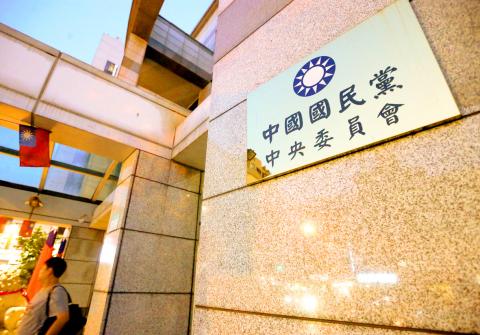The Chinese Nationalist Party’s plan to set a date and new guidelines for its presidential primary could be postponed after the party canceled KMT Chairman Wu Den-yih’s (吳敦義) planned meetings with former New Taipei City mayor Eric Chu (朱立倫), KMT Legislator Wang Jin-pyng (王金平) and Kaohsiung Mayor Han Kuo-yu (韓國瑜).
The KMT had originally planned to pass the guidelines and set a date for the primary in a Central Standing Committee meeting on Wednesday and announce the results on Wednesday next week.
However, the party on Saturday canceled Wu’s planned meetings with Chu and Wang after Chu insisted that the meetings be public.

Photo: CNA
The party would discuss its response before and during Wednesday’s meeting and ensure that things are handled in a way easy for all to accept, KMT spokesman Ouyang Long (歐陽龍) said yesterday.
While the plan to set a date and establish guidelines for the primary could be postponed, they would still be completed by the end of this month as planned, without affecting the primary, he said.
KMT Central Standing Committee member William Hsu (徐弘庭) criticized the decision, saying that the party can no longer afford such delays.
If the party wants to nominate Han, it should do so and bring the case to the committee, he said.
If it is worried about a lack of support, then it should initiate a national convention, Hsu added.
The party must take action now or it would remain stuck on whether to enlist Han in the presidential race, he said, adding that discussing guidelines and a date for the primary before Wu has met anyone “makes no sense.”
Committee member Yao Chiang-ling (姚江臨) expressed a similar opinion, saying that the best way would be for Wu to talk to all potential candidates before passing a set of guidelines that must be followed.
Committee member Tseng Wen-pei (曾文培) urged Wu to be more direct in his approach.
When then-KMT presidential candidate Hung Hsiu-chu (洪秀柱) was replaced by Chu in 2015, the party did not discuss the plan with Hung in advance, he said, adding that Wu does not need the consent of all primary candidates.
A majority of low-level party members agree that Han should be enlisted for the presidential race, he said, adding that events could unfold in three ways.
First, the party could set down guidelines and a date for the primary on Wednesday and require all primary candidates to adhere to them, although it would lead to serious divisions later on, he said.
Second, the party could conduct a poll to gauge public support for Chu, Wang and Han, and nominate one of them according to the results without holding further meetings with each candidate, Hsu said.
Third, it could postpone Wednesday’s discussion for the guidelines and the date until Wu has had a chance to meet with all three potential candidates, especially Han, he said.

‘DENIAL DEFENSE’: The US would increase its military presence with uncrewed ships, and submarines, while boosting defense in the Indo-Pacific, a Pete Hegseth memo said The US is reorienting its military strategy to focus primarily on deterring a potential Chinese invasion of Taiwan, a memo signed by US Secretary of Defense Pete Hegseth showed. The memo also called on Taiwan to increase its defense spending. The document, known as the “Interim National Defense Strategic Guidance,” was distributed this month and detailed the national defense plans of US President Donald Trump’s administration, an article in the Washington Post said on Saturday. It outlines how the US can prepare for a potential war with China and defend itself from threats in the “near abroad,” including Greenland and the Panama

The Chinese Nationalist Party (KMT) is maintaining close ties with Beijing, the Democratic Progressive Party (DPP) said yesterday, hours after a new round of Chinese military drills in the Taiwan Strait began. Political parties in a democracy have a responsibility to be loyal to the nation and defend its sovereignty, DPP spokesman Justin Wu (吳崢) told a news conference in Taipei. His comments came hours after Beijing announced via Chinese state media that the Chinese People’s Liberation Army’s Eastern Theater Command was holding large-scale drills simulating a multi-pronged attack on Taiwan. Contrary to the KMT’s claims that it is staunchly anti-communist, KMT Deputy

RESPONSE: The government would investigate incidents of Taiwanese entertainers in China promoting CCP propaganda online in contravention of the law, the source said Taiwanese entertainers living in China who are found to have contravened cross-strait regulations or collaborated with the Chinese Communist Party (CCP) could be subject to fines, a source said on Sunday. Several Taiwanese entertainers have posted on the social media platform Sina Weibo saying that Taiwan “must be returned” to China, and sharing news articles from Chinese state media. In response, the Mainland Affairs Council (MAC) has asked the Ministry of Culture to investigate whether the entertainers had contravened any laws, and asked for them to be questioned upon their return to Taiwan, an official familiar with the matter said. To curb repeated

Myanmar has turned down an offer of assistance from Taiwanese search-and-rescue teams after a magnitude 7.7 earthquake struck the nation on Friday last week, saying other international aid is sufficient, the National Fire Agency said yesterday. More than 1,700 have been killed and 3,400 injured in the quake that struck near the central Myanmar city of Mandalay early on Friday afternoon, followed minutes later by a magnitude 6.7 aftershock. Worldwide, 13 international search-and-rescue teams have been deployed, with another 13 teams mobilizing, the agency said. Taiwan’s search-and-rescue teams were on standby, but have since been told to stand down, as